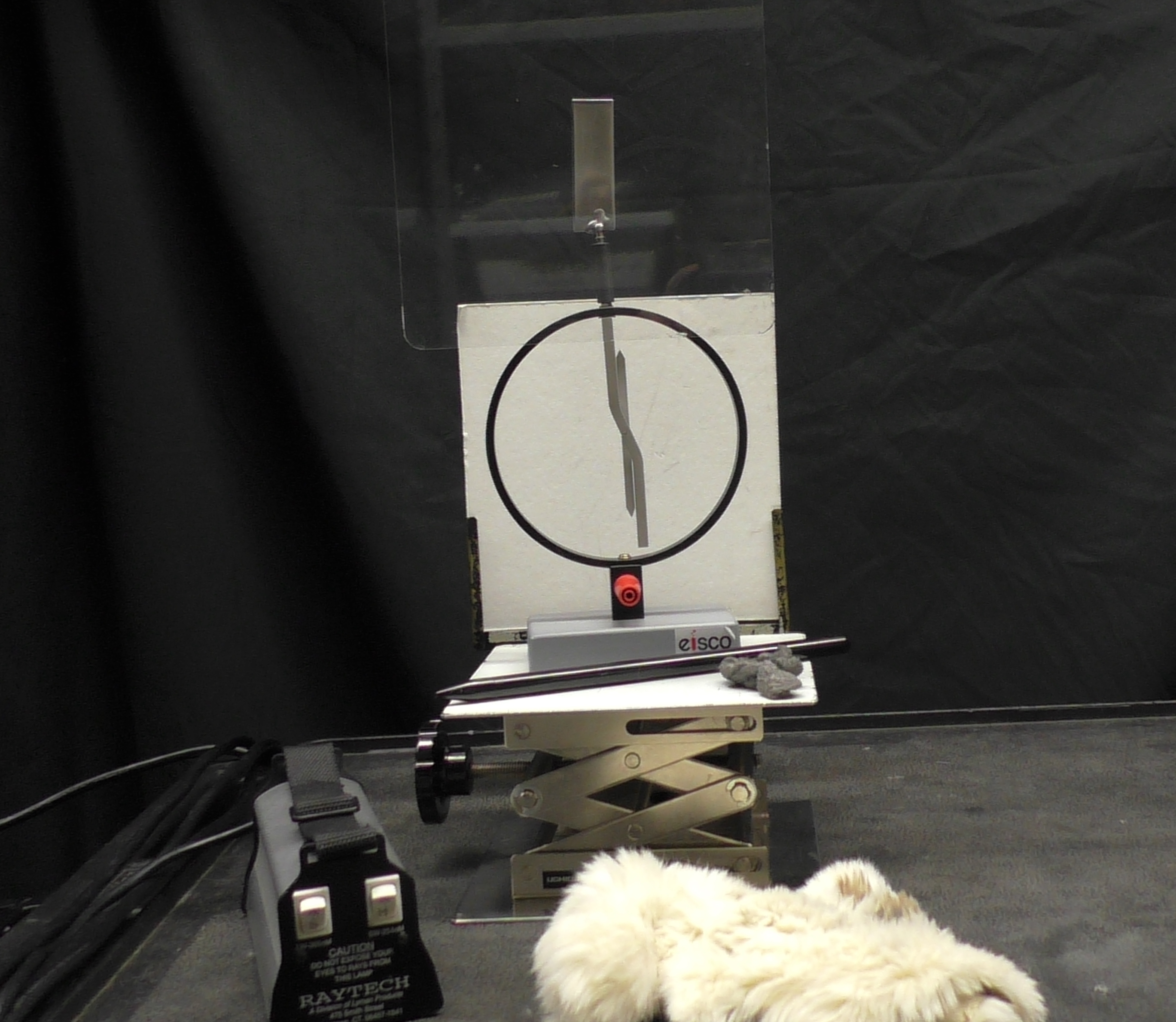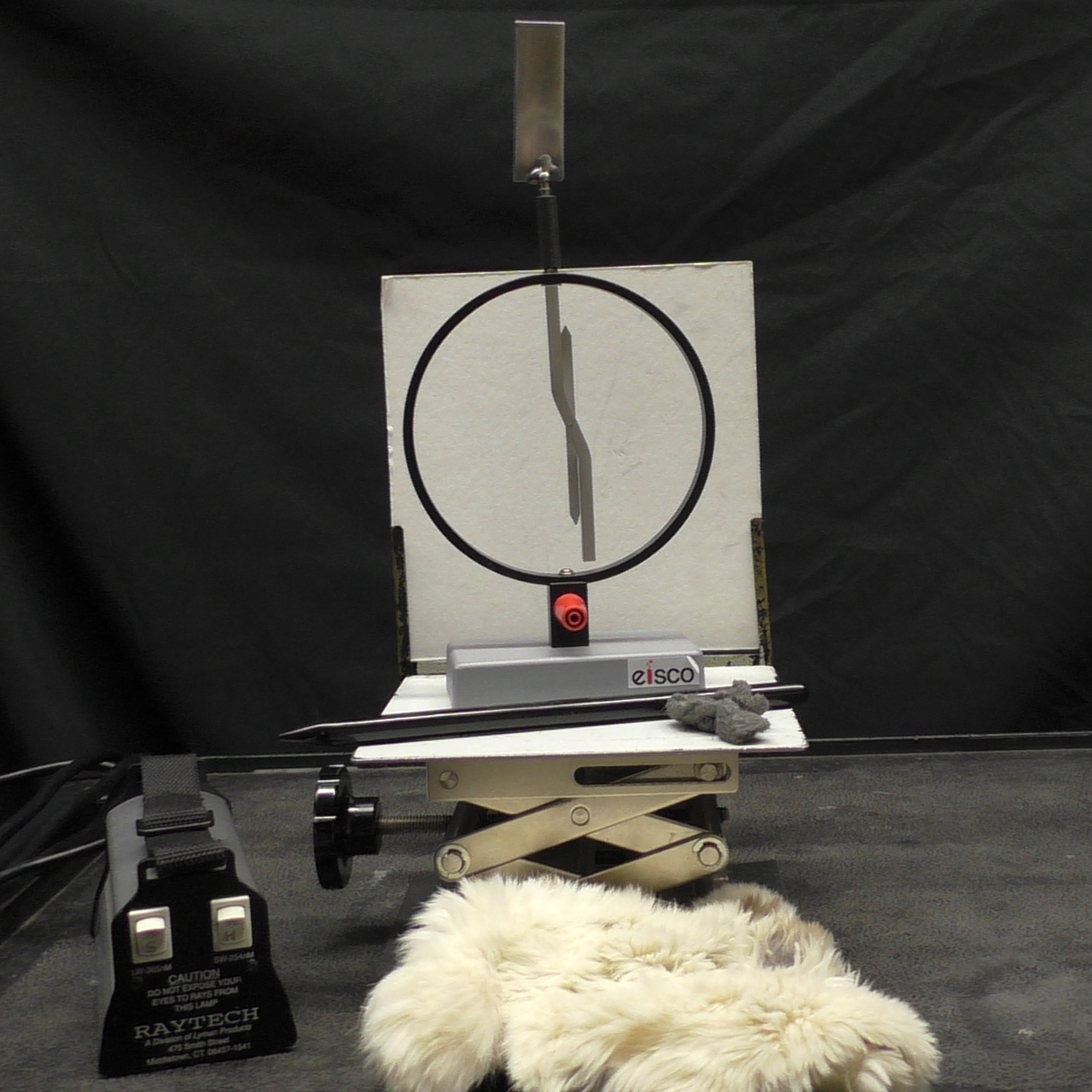Difference between revisions of "Photoelectric effect"
From UO Physics Demonstration Catalog
(Created page with "{{NewDemo|subject=Modern|topic=Quantum Physics|file1=photoelectric_effect.JPG|file2=photoelectric_effect_1.JPG}} First, the zinc plate connected to the top of the electroscope must be rubbed with steel wool to take away the zinc oxide that will naturally occur on the surface. The electroscope is charged up with electrons from a rod that has been rubbed with fur. Scrape the rod along the plate attached to the top of the electroscope to fully charge the electroscope. When...") |
|||
| (One intermediate revision by one other user not shown) | |||
| Line 1: | Line 1: | ||
{{NewDemo|subject=Modern|topic=Quantum Physics|file1=photoelectric_effect. | {{NewDemo|subject=Modern|topic=Quantum Physics|file1=photoelectric_effect.jpeg|file2=photoelectric_effect_1.jpeg}} | ||
First, the zinc plate connected to the top of the electroscope must be rubbed with steel wool to take away the zinc oxide that will naturally occur on the surface. The electroscope is charged up with electrons from a rod that has been rubbed with fur. Scrape the rod along the plate attached to the top of the electroscope to fully charge the electroscope. When the upper plate is exposed to regular light or green laser light, nothing happens, no matter how intense the light is. Also, if exposed to long wavelength UVA, nothing happens. If exposed to short wavelength UVB light radiation the scope rapidly discharges. When positively charged this effect is not seen. Also, when a piece of plate glass is used to block the UV light, it will not discharge since the glass absorbs the UVB light. | First, the zinc plate connected to the top of the electroscope must be rubbed with steel wool to take away the zinc oxide that will naturally occur on the surface. The electroscope is charged up with electrons from a rod that has been rubbed with fur. Scrape the rod along the plate attached to the top of the electroscope to fully charge the electroscope. When the upper plate is exposed to regular light or green laser light, nothing happens, no matter how intense the light is. Also, if exposed to long wavelength UVA, nothing happens. If exposed to short wavelength UVB light radiation the scope rapidly discharges. When positively charged this effect is not seen. Also, when a piece of plate glass is used to block the UV light, it will not discharge since the glass absorbs the UVB light. | ||
| Line 7: | Line 7: | ||
* Electroscope: Shelf I-3 | * Electroscope: Shelf I-3 | ||
* UV Light: Shelf Q-3 | * UV Light: Shelf Q-3 | ||
*Electrostatic White Teflon Rod or black plastic rod and Fur: Drawer 68 | |||
Latest revision as of 09:53, 23 January 2023
Return to Quantum Physics
Description:
First, the zinc plate connected to the top of the electroscope must be rubbed with steel wool to take away the zinc oxide that will naturally occur on the surface. The electroscope is charged up with electrons from a rod that has been rubbed with fur. Scrape the rod along the plate attached to the top of the electroscope to fully charge the electroscope. When the upper plate is exposed to regular light or green laser light, nothing happens, no matter how intense the light is. Also, if exposed to long wavelength UVA, nothing happens. If exposed to short wavelength UVB light radiation the scope rapidly discharges. When positively charged this effect is not seen. Also, when a piece of plate glass is used to block the UV light, it will not discharge since the glass absorbs the UVB light.
Location:
- Electroscope: Shelf I-3
- UV Light: Shelf Q-3
- Electrostatic White Teflon Rod or black plastic rod and Fur: Drawer 68

